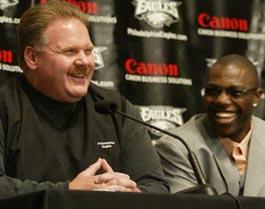A Baptist deacon asked his pastor to go with him to invite a friend/co-worker to an upcoming Easter service. The pastor, of course, accepted the invitation immediately. The pastor met the deacon at the church at the appointed time. They left in the deacon's truck and headed to their appointment.
As they engaged in conversation about their favorite mutual subject of football, the pastor noticed that the deacon was headed down a street that was known primarily for it's night life. No, not night life as in bats or raccoons or even the opera. Night life, as in bars and strip joints. The pastor asked where they were going to meet the invitee. The deacon named the bar. The deacon then asked if the pastor wanted to turn around and go back to the church. The pastor, being the rebel he was and remembering how Jesus mingled with all kinds of people, told the deacon to drive on to the appointment.
The appointment was kept by the invitee/friend/co-worker only because the deacon knew that his friend could always be found at this bar, on this day of the week, having a beer and shooting a game of pool. The deacon pulled into the parking lot of the bar and parked. The pastor looked around to see if any members were driving by and got out knowing this is what Jesus would have done.
The deacon and pastor walked into the bar and made small talk. Being "good" Baptists, they ordered two Pepsi's and got in line on the invitee/friend/co-worker's table. The deacon's friend was, admittedly, taken back by having his Christian friend come into "his world". And when the deacon's friend asked who the friend was he had with him, he was taken back even more. The deacon and the pastor got beat like a drum at the pool table but they made a positive impact on the non-Christians in the bar that night. The invitee/friend/co-worker didn't attend the Easter service, but he was closer to listening to God's message of forgiveness more than ever before.
The pastor never told his church members he went to the bar. He didn't want the deacon to get in trouble.
. . . . . . . . . . . . . . . . . . . . . . . . . . . . . . . . . . . . . . . . . . . . . . . . . . . . . . . . . . .
Growing up in the Christian subculture, I was taught a form of bigotry. It was a bigotry targeted at non-Christians. Kind of strange, don't you think? In the very same house, I was taught to respect people of other ethnicities and cultures. Even though we were from the South, the "n" word was
verboten in our home and rightly so. Being the son of a pastor, I was raised in a home that place a high view on international missions. The result of that was a personal desire on my part to learn and investigate other cultures. The culture of North Africa deeply intrigues me to this day.
The bigotry, of sorts, against non-Christians in my earlier years was a genuine attempt of my parents to keep me from running with the wrong crowd. After all, Socrates did say that "birds of a feather flock together." There is a thread of wisdom to be embraced here, no doubt. But when I began to read the Bible more intensely in my latter 20's, I came across a number of passages that completely blew apart my worldview of non-Christians . No longer could I say, "They just need God." I had to say, "I need to be their friend so they can see Jesus in me." (It also meant I needed live a more authentic Christian life.) Christ hung out with the disciples for sure. He also spent most of his social life in the presence of people that the religious people thought were off limits...white collar criminals, prostitutes, and those with socially unacceptable diseases to name a few.
The following passage of Scripture should challenge every Christian that reads this devotional. Especially if their view is that Christians should only have other Christians as friends.
So buckle up all you Christians, we're going for a ride...this devotional might make you a bit queasy.
I have written you in my letter not to associate with sexually immoral people— 10not at all meaning the people of this world who are immoral, or the greedy and swindlers, or idolaters. In that case you would have to leave this world. (1Corinthianss 5:9-10, NIV; emphasis mine).
As Christians, we can't be isolationists. Secluding ourselves from those that are not yet Christians, to paraphrase Paul, would mean that we would have to pack up and move to Mars or something. Over my many years of being in the Christian subculture, I have heard people say in arrogance or ignorance that they had nothing other than Christian friends. The arrogant wear it as a badge of honor. The ignorant probably would have non-Christian friends but they've either been sucked into the legalistic Christian subculture or they simply haven't thought that much about it. The reason for this blog entry/devotional is to jar some and nudge whoever is left.
So how do you have non-Christian friends without being influenced to the point of indulging in the things that cause them and you pain and misery? How do you make a difference in the world without compromising the spirituality that's transformed your life? Do what Jesus did. He had a core of God-followers that he was around the most. When he spent time with those who weren't yet God-followers, it was always after he had spent a lot of time talking to the Heavenly Father in prayer. Talking to God a lot also prepared Jesus for the criticism he would receive from the Pharisees, i.e. religious jerks. (On a very encouraging note to those that attend
The Journey Church, you don't have to worry too much about Pharisees in our faith community.)
If you're a follower of Christ and you lack non-Christian friends, get some. It's the only way to make a difference in the world for God. Have Christian friends, but be a friend to those who aren't Christ followers yet. Don't take my word for it. Take Jesus' word for it:
9As Jesus went on from there, he saw a man named Matthew sitting at the tax collector's booth. "Follow me," he told him, and Matthew got up and followed him. 10While Jesus was having dinner at Matthew's house, many tax collectors and "sinners" came and ate with him and his disciples. 11When the Pharisees saw this, they asked his disciples, "Why does your teacher eat with tax collectors and 'sinners'?" 12On hearing this, Jesus said, "It is not the healthy who need a doctor, but the sick. 13But go and learn what this means: 'I desire mercy, not sacrifice.' For I have not come to call the righteous, but sinners" (Matthew 9:9-13, NIV).
It's time we all made some new friends, isn't it?
Have a great day
 This is a picture from March, 2004. Happy times. Terrell Owens is getting what he wants. A seven-year contract worth almost $49 million.
This is a picture from March, 2004. Happy times. Terrell Owens is getting what he wants. A seven-year contract worth almost $49 million.
